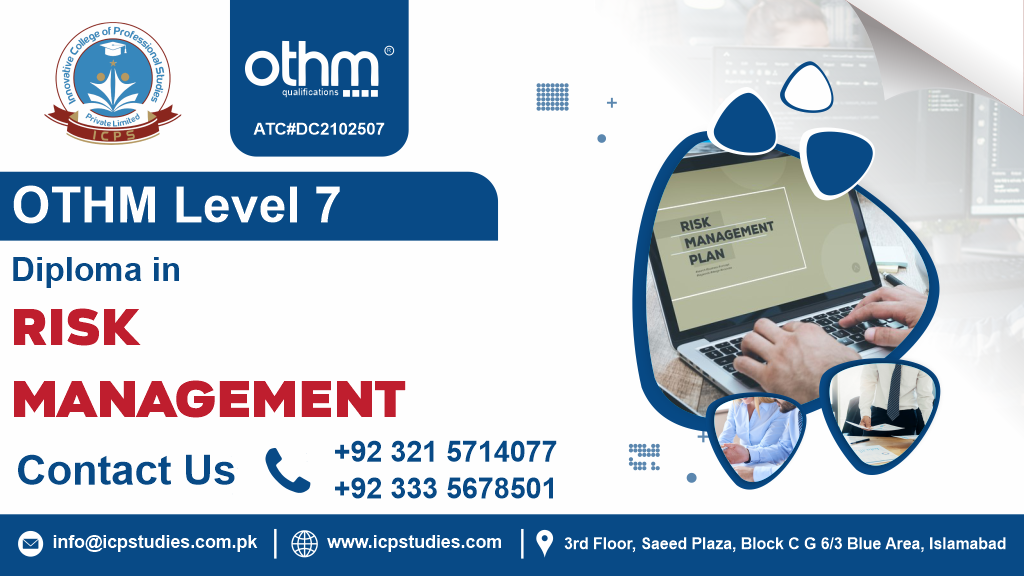othm level 7 diploma in risk management in pakistan
OTHM Level 7 Diploma In Risk Management in pakistan
In an increasingly complex and interconnected world, managing risk has become paramount for organizations across all sectors. Whether it's financial institutions, healthcare providers, or manufacturing companies, the ability to identify, assess, and mitigate risks is critical for sustainable growth and resilience. Recognizing this need, the OTHM Level 7 Diploma in Risk Management emerges as a comprehensive program tailored to equip professionals in Pakistan with the knowledge and skills to navigate uncertainty effectively.
The OTHM Level 7 Diploma in Risk Management offers a holistic approach to risk management, encompassing both theoretical foundations and practical applications. Accredited by the Office of the Qualifications and Examinations Regulation (Ofqual) and developed in consultation with industry experts, this diploma provides participants with a robust framework to analyze, evaluate, and mitigate risks across various organizational contexts.
Study Units:
The course curriculum comprises a series of meticulously designed study units, each addressing key aspects of risk management. These units include:
-
Principles of Risk Management: This foundational unit introduces learners to the fundamental concepts and principles of risk management. Participants explore the risk management process, including risk identification, assessment, treatment, and monitoring, laying the groundwork for subsequent study units.
-
Risk Assessment and Analysis: Building upon the foundational knowledge, this unit delves into the methodologies and techniques used to assess and analyze risks. From quantitative methods such as risk modeling and scenario analysis to qualitative approaches like risk matrices and bowtie diagrams, participants learn to identify and prioritize risks effectively.
-
Risk Governance and Compliance: In today's regulatory landscape, compliance with legal and regulatory requirements is paramount. This unit examines the role of governance structures, policies, and procedures in managing risk and ensuring compliance with relevant standards and regulations.
-
Strategic Risk Management: Strategic risks have the potential to impact an organization's long-term objectives and viability. In this unit, learners explore the strategic dimensions of risk management, including strategic risk identification, analysis, and response strategies to safeguard organizational goals and competitiveness.
-
Operational Risk Management: Operational risks arise from internal processes, systems, and human factors within an organization. This unit focuses on identifying, assessing, and mitigating operational risks across various functional areas, such as supply chain management, information technology, and human resources.
Learning Outcomes:
Upon successful completion of the OTHM Level 7 Diploma in Risk Management, participants can expect to achieve the following learning outcomes:
- Demonstrate a comprehensive understanding of risk management principles, concepts, and frameworks.
- Apply a range of risk assessment methodologies and tools to identify, analyze, and prioritize risks effectively.
- Develop risk management strategies and plans aligned with organizational objectives and risk appetite.
- Implement robust risk governance structures and compliance mechanisms to ensure adherence to regulatory requirements and industry standards.
- Evaluate and mitigate strategic and operational risks to enhance organizational resilience and sustainability.
Who is This Course For?
The OTHM Level 7 Diploma in Risk Management is designed for professionals across various sectors who are involved in risk management or aspire to pursue a career in this field. This includes:
- Risk Managers: Professionals responsible for overseeing risk management processes and strategies within organizations, including risk managers, chief risk officers, and risk analysts.
- Compliance Officers: Individuals tasked with ensuring organizational compliance with regulatory requirements and industry standards, including compliance officers, legal counsel, and regulatory affairs specialists.
- Financial Professionals: Professionals working in the financial services industry, such as bankers, investment analysts, and insurance underwriters, seeking to enhance their risk management expertise.
- Project Managers: Project managers and project team members involved in planning and executing complex projects, where risk management plays a crucial role in project success and delivery.
- Business Leaders: Entrepreneurs, business owners, and senior executives looking to develop a strategic understanding of risk management to drive informed decision-making and mitigate business risks.
Future Progression:
Upon completion of the OTHM Level 7 Diploma in Risk Management, graduates have a myriad of opportunities for future progression and advancement. Some potential pathways include:
- Advanced Certifications: Graduates may pursue advanced certifications or professional designations in risk management, such as the Certified Risk Manager (CRM), Certified Financial Risk Manager (FRM), or Chartered Enterprise Risk Analyst (CERA), to further enhance their credentials and expertise.
- Specialization: With a solid foundation in risk management, individuals can explore specialized areas such as cyber risk management, enterprise risk management (ERM), or financial risk management, depending on their interests and career goals.
- Higher Education: The diploma serves as a solid foundation for further academic pursuits, including master's degrees or doctoral studies in related fields such as risk management, business administration, or finance.
- Consultancy and Advisory Roles: Armed with advanced risk management skills and knowledge, graduates may pursue consultancy or advisory roles, providing strategic guidance and solutions to organizations seeking to enhance their risk management practices.
- Organizational Leadership: For those in managerial or leadership positions, the diploma equips them with valuable risk management skills to drive organizational resilience, strategic decision-making, and long-term value creation.
The OTHM Level 7 Diploma in Risk Management offers a transformative learning experience for professionals seeking to navigate the complexities of risk in Pakistan's dynamic business environment. By combining theoretical insights with practical applications, this diploma empowers participants to identify emerging risks, implement robust risk management strategies, and drive organizational success in an uncertain world. Whether aspiring risk managers, seasoned professionals, or visionary leaders, learners emerge equipped to make informed decisions, mitigate risks, and seize opportunities for growth and innovation.

